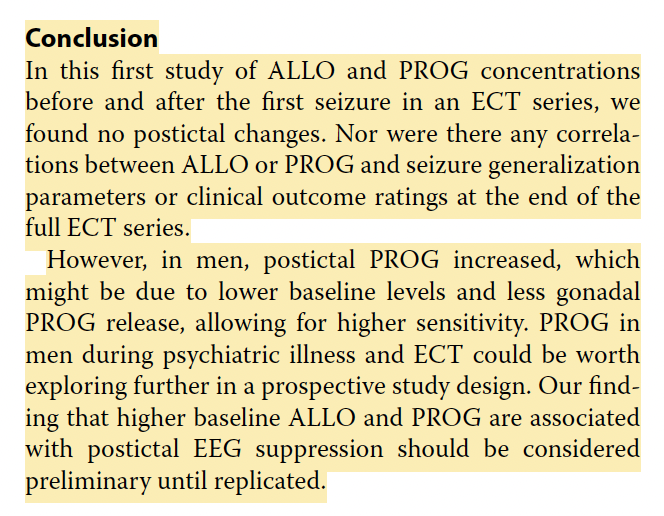Allopregnanolone and Progesterone in Relation to a Single ECT Seizure and Clinical Outcome: an Observational Cohort Study From Sweden
Out on PubMed, from researchers in Sweden, is this study:
Allopregnanolone and progesterone in relation to a single electroconvulsive therapy seizure and subsequent clinical outcome: an observational cohort study.
BMC Psychiatry. 2024 Oct 15;24(1):687. doi: 10.1186/s12888-024-06167-3.PMID: 39407178
Background: Electroconvulsive therapy (ECT) is an important treatment for several severe psychiatric conditions, yet its precise mechanism of action remains unknown. Increased inhibition in the brain after ECT seizures, mediated by γ-aminobutyric acid (GABA), has been linked to clinical effectiveness. Case series on epileptic patients report a postictal serum concentration increase of the GABAA receptor agonist allopregnanolone. Serum allopregnanolone remains unchanged after a full ECT series, but possible transient effects directly after a single ECT seizure remain unexplored. The primary aim was to measure serum concentrations of allopregnanolone and its substrate progesterone after one ECT seizure. Secondary aims were to examine whether concentrations at baseline, or postictal changes, either correlate with seizure generalization or predict clinical outcome ratings after ECT.
Methods: A total of 130 participants (18-85 years) were included. Generalization parameters comprised peak ictal heart rate, electroencephalographic (EEG) seizure duration, and prolactin increase. Outcome measures were ratings of clinical global improvement, perceived health status and subjective memory impairment. Non-parametric tests were used for group comparisons and correlations. The prediction analyses were conducted with binary logistic and simple linear regression analyses.
Results: Allopregnanolone and progesterone remained unchanged and correlated neither with seizure generalization nor with clinical outcome. In men (n = 50), progesterone increased and allopregnanolone change correlated negatively with EEG seizure duration. In a subgroup analysis (n = 62), higher baseline allopregnanolone and progesterone correlated with postictal EEG suppression.
Conclusions: ECT seizures have different physiologic effects than generalized seizures in epilepsy. Progesterone might have implications for psychiatric illness in men.
Keywords: Allopregnanolone; Electroconvulsive therapy; epileptic seizures; Progesterone.
The article is here.
And from the text:
This paper reports data from an add-on study to a previous Swedish registry study. Although largely negative, it has some very interesting points about neuroactive steroid hormones, and their interaction with the GABA system and neurogenesis. The finding of increased postictal PROG in depressed male patients is intriguing.
The limitations of the study design and methods are well described by the authors, and they note the need for replication before any conclusions can be reached.







Comments
Post a Comment